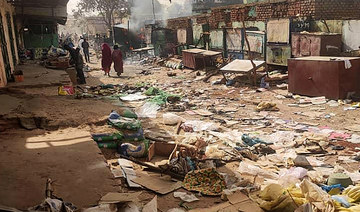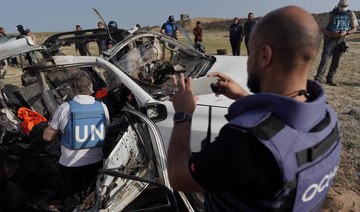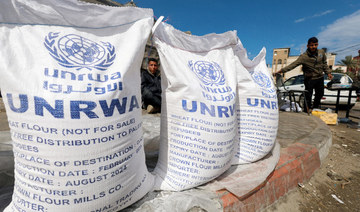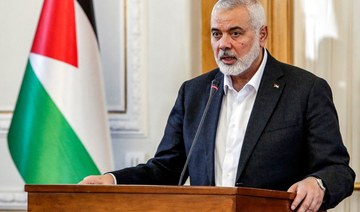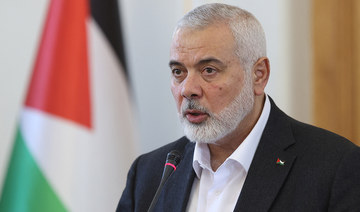RAMALLAH, West Bank: In a divorce court where a man’s testimony is worth twice a woman’s, victory for lawyer Reema Shamasneh is rare and often bittersweet.
On this morning, a young nurse is desperate to end her marriage to a truck driver who she says beat her, doused her with scalding tea and kept her from seeing her dying mother. But her husband will only agree if she forgoes all alimony, including the $14,000 stipulated in the marriage contract.
Eager to escape and claim her young son, she says yes. The man stands before a copy of the Qur’an, the Muslim holy book, and repeats after an Islamic judge: “You are divorced.”
Shamasneh blinks back tears of relief and frustration, and then quickly composes herself.
“This is not a big victory,” the 39-year-old lawyer says with an air of quiet determination. “I gave her what she wanted, but at the same time I am not happy because she gave up her rights.”
Dressed in the headscarf and long robe of a devout Muslim, Shamasneh fights for Arab women in the most intimate arena of their lives: Marriage and divorce.
While countries such as Tunisia and Morocco have introduced reforms, brides in others must still be represented by male guardians who sign marriage contracts. Men can divorce on a whim, while women must prove cause. And polygamy is legal only for men.
Such notions enjoy strong support, even among women. In a 2013 poll by the Pew Research Center, large majorities in seven Arab countries said a woman should obey her husband, from 74 percent in Lebanon to 87 percent in the Palestinian territories and 93 percent in Tunisia.
“We cannot copy the Western laws because the Western societies are different and they have very complicated problems,” says Maryam Saleh, a representative of the Islamic fundamentalist group Hamas in the now-defunct Palestinian parliament.
But Shamasneh believes the laws are the way they are because they were passed by men.
“They were raised in a certain culture that says men are better than women, and this is reflected in the laws,” she says.
As a girl in the farming village of Qatana, Shamasneh would see women get the leftovers at wedding feasts, after the men. And while her four brothers could come and go, she and her five sisters had to account for their limited movements.
“Until now, there is discrimination, even with simple things,” she says. “This makes me angry.”
However, her father Mohammed, a retired contractor, wanted all his children, including the girls, to get an education. Shamasneh chose law, a profession that turned out to be a good fit for her pragmatic, analytical nature.
Her 74-year-old mother Amneh, sitting across from Shamasneh, says she is proud of her daughter’s success. But her mother was against her studies, Shamasneh interjects.
“At the time, it was shameful for a woman to study and have a job,” Amneh says apologetically.
Amneh herself was married off at age 13, without her consent, and had her first child at 15. Four of Shamasneh’s sisters married in their 20s. A fifth was forced into an arranged match at 16 and endured a prolonged divorce two years later.
Shamasneh was a child at the time. She says the bitter experience, including the lack of empathy displayed by her sister’s male lawyer, fueled her interest in law.
As a single woman, Shamasneh’s only socially acceptable option is to continue living with her parents. She says she would move out if she wanted to, but she likes spending time with her parents. In her childhood bedroom, law books are lined up on a shelf above her dresser.
She is fiercely protective of her relative independence. For her, this means not getting married.
“I can take care of myself,” Shamasneh says. “I am a strong woman. I hate traditional marriage.”
On a typical day, Shamasneh arrives before 9 a.m. at the Islamic courthouse in Ramallah. One recent morning, she meets a 25-year-old client, a thin, pale woman in a frayed green robe who says she wants a divorce from her abusive husband.
Her father is also there to testify on her behalf, but her brother didn’t turn up because he was sick. Shamasneh sternly cautions her client that this may hurt her case, because the court usually requires two male witnesses or a man and two women.
In a small victory, the judge rules later that day that the case can move forward.
The growing presence of female lawyers like Shamasneh has helped create more empathy for women going through divorce. When Shamasneh began practicing 15 years ago, female lawyers were rare.
Now women occasionally outnumber men in the courthouse.
There’s even a female judge. Kholoud Al-Faqeeh defends the law in principle, saying that it reflects different gender roles, and that women sometimes fail to exhaust their legal rights.
Still, the judge occasionally reins in men appearing before her. When a witness in a custody hearing portrays a sister-in-law as an unfit mother because she holds down two jobs, the judge, a mother of four, snaps: “Palestinian women work. Do you want us all to give up our children?“
On another day, Shamasneh challenges a male colleague’s claim that Islamic law gives the same rights to men and women seeking divorce. She refuses to give in. When he appears to run out of arguments, he resorts to “It’s in the Qur’an.”
Mahmoud Habbash, the head of the Islamic courts in the West Bank, warns that the views advocated by Shamasneh and other activists could lead to the collapse of society. He argues that men and women are different by nature and require different rules.
“The problem is that in the West, you don’t understand how we treat women,” Habbash says. “We treat them like queens.”
Only one-third of Palestinians support a wife’s right to divorce at all, according to the Pew survey. Across the region, support for divorce rights for women is even lower in Jordan, Egypt and Iraq, but is backed by a majority in Lebanon, Morocco and Tunisia. Some countries allow “khula” divorce, where a wife pays the husband compensation to get out of a marriage.
With so much opposition, Shamasneh knows that a long road lies ahead. Progress on legal reform has stalled, because the Palestinian self-rule government has limited authority in the Israeli-occupied West Bank.
At home, her village remains deeply conservative. The local mosque preacher, Yacoub Al-Faqeeh, says that while he respects Shamasneh, he sharply disagrees with demands for equal marriage and divorce rights.
“If women are free in divorce, they will divorce every day because they are emotional, while men are rational,” he says.
Shamasneh could emigrate and join two brothers in Douglasville, Georgia. She has visited the area seven times, traveling without a male chaperone. “People talk, but I don’t care,” she says.
Yet life in the West holds no allure. Everything is too easy, she says. The struggle for women in her community gives her life meaning, and she couldn’t imagine doing anything else.
“People in the village are resisting change,” she says. “Therefore, I invest my energies in the court.”
__
Associated Press writer Aya Batrawy in Dubai contributed reporting.
Palestinian lawyer fights for women, one divorce at a time
Palestinian lawyer fights for women, one divorce at a time
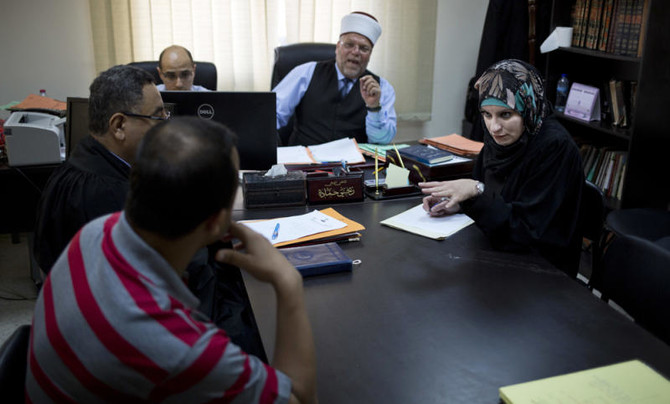
Tehran plays down reported Israeli attacks, signals no further retaliation
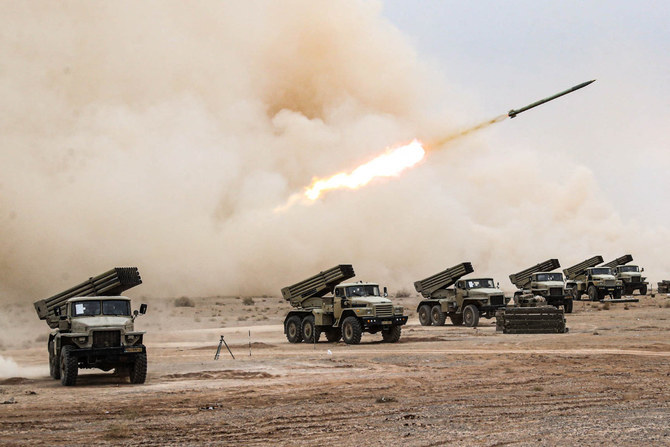
- United States received advance notice of Israel’s reported strike on Iran, reports US media
- Countries around the world called on both sides to avert further escalation amid tensions
DUBAI/JERUSALEM: Explosions echoed over an Iranian city on Friday in what sources described as an Israeli attack, but Tehran played down the incident and indicated it had no plans for retaliation — a response that appeared gauged toward averting region-wide war.
The limited scale of the attack and Iran’s muted response both appeared to signal a successful effort by diplomats who have been working round the clock to avert all-out war since an Iranian drone and missile attack on Israel last Saturday.
Iranian media and officials described a small number of explosions, which they said resulted from Iran’s air defenses hitting three drones over the city of Isfahan. Notably, they referred to the incident as an attack by “infiltrators,” rather than by Israel, obviating the need for retaliation.
An Iranian official said there were no plans to respond against Israel for the incident.
“The foreign source of the incident has not been confirmed. We have not received any external attack, and the discussion leans more toward infiltration than attack,” the official said.
Israel said nothing about the incident. It had said for days it was planning to retaliate against Iran for Saturday’s strikes, the first ever direct attack on Israel by Iran in decades of shadow war waged by proxies which has escalated throughout the Middle East through six months of battle in Gaza.
The United States received advance notice of Israel’s reported strike on Iran but did not endorse the operation or play any part in its execution, US media quoted officials as saying.
NBC and CNN, citing sources familiar with the matter and a US official, respectively, said Israel had provided Washington with pre-notification of the strike.
Various networks cited officials confirming a strike had taken place inside Iran, with CNN quoting one official as stating the target was not a nuclear facility.
The two longstanding foes had been heading toward direct confrontation since a presumed Israeli airstrike on April 1 that destroyed a building in Iran’s embassy compound in Damascus and killed several Iranian officers including a top general.
Iran’s response, with a direct attack on Israel, was unprecedented but caused no deaths and only minor damage because Israel and its allies shot down hundreds of missiles and drones.
Allies including the United States had since been pressing hard to ensure any further retaliation would be calibrated not to provoke a spiral of hostilities. The British and German foreign ministers visited Jerusalem this week, and Western countries tightened sanctions on Iran to mollify Israel.
In a sign of pressure within Israel’s hard-right government for a stronger response, Itamar Ben Gvir, the far-right national security minister tweeted a single word after Friday’s strikes: “Feeble!.”
Countries around the world called on Friday for both sides to avert further escalation.
“It is absolutely necessary that the region remains stable and that all sides restrain from further action,” EU Commission head Ursula von der Leyen said. Similar calls came from Beijing and from Arab states in the region.
In financial markets, global shares eased, oil prices surged and US bond yields fell as traders worried about the risks.
NO MENTION OF ISRAEL
Within Iran, news reports on Friday’s incident made no mention of Israel, and state television carried analysts and pundits who appeared dismissive about the scale.
An analyst told state TV that mini drones flown by “infiltrators from inside Iran” had been shot down by air defenses in Isfahan.
Shortly after midnight, “three drones were observed in the sky over Isfahan. The air defense system became active and destroyed these drones in the sky,” Iranian state TV said.
Senior army commander Siavosh Mihandoust was quoted by state TV as saying air defense systems had targeted a “suspicious object.”
Iranian President Ebrahim Raisi had warned Israel before Friday’s strike that Tehran would deliver a “severe response” to any attack on its territory.
Iran told the United Nations Security Council on Thursday that Israel “must be compelled to stop any further military adventurism against our interests” as the UN secretary-general warned that the Middle East was in a “moment of maximum peril.”
By morning, Iran had reopened airports and airspace that were shut during the strikes.
Still, there was alarm over security in Israel and elsewhere. The US Embassy in Jerusalem restricted US government employees from travel outside Jerusalem, greater Tel Aviv and Beersheba “out of an abundance of caution.”
In a statement, the embassy warned US citizens of a “continued need for caution and increased personal security awareness as security incidents often take place without warning.”
Israel’s assault on Gaza began after Hamas Islamists attacked Israel on Oct. 7, killing 1,200, according to Israeli tallies. Israel’s military offensive has killed about 34,000 Palestinians in Gaza, according to the Gazan health ministry.
Iran-backed groups have declared support for Palestinians, carrying out attacks from Lebanon, Yemen and Iraq, raising fears the Gaza conflict could grow into a wider regional war.
UN warns of new flashpoint in Sudan’s Darfur region
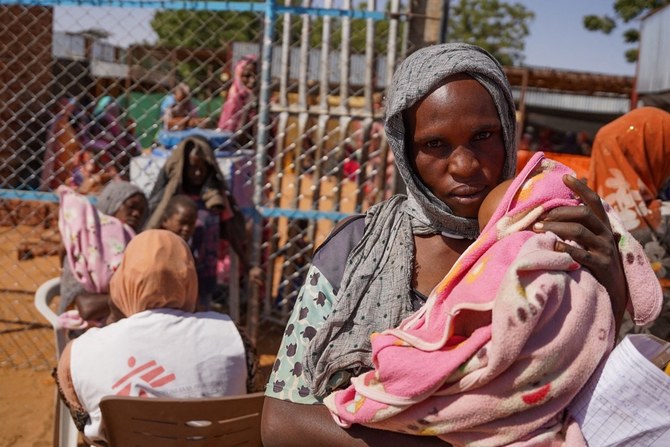
United Nations, US: Senior UN officials warned the Security Council on Friday of the risks of a new front opening in Sudan, around the town of el-Fasher in Darfur, where the population is already on the brink of starvation.
After a year of war between the armed forces (SAF) of General Abdel Fattah Al-Burhan and the paramilitaries of the Rapid Support Forces (FSR), under the command of General Mohamed Hamdan Dagalo, the country is experiencing “a crisis of epic proportions... wholly man-made,” denounced Rosemary DiCarlo, UN under-secretary-general for political and peacebuilding affairs.
“The warring parties have ignored repeated calls to cease their hostilities... Instead, they have stepped up preparations for further fighting, with both the SAF and the RSF continuing their campaigns to recruit civilians,” DiCarlo said.
In particular, she voiced concern at reports of a possible “imminent” attack by the RSF on el-Fasher, the only capital of the five Darfur states it does not control, “raising the specter of a new front in the conflict.”
El-Fasher acts as a humanitarian hub for Darfur, which is home to around a quarter of Sudan’s 48 million inhabitants.
Until recently, the town had been relatively unaffected by the fighting, hosting a large number of refugees. But since mid-April, bombardments and clashes have been reported in the surrounding villages.
“Since then, there have been continuing reports of clashes in the eastern and northern parts of the city, resulting in more than 36,000 people displaced,” said Edem Wosornu, a director at for the UN’s Office for the Coordination of Humanitarian Affairs, noting that Doctors Without Borders has treated more than 100 casualties in el-Facher in recent days.
“The total number of civilian casualties is likely much higher.”
“The violence poses an extreme and immediate danger to the 800,000 civilians who reside in el-Fasher. And it risks triggering further violence in other parts of Darfur,” she warned.
DiCarlo added that fighting in el-Fasher “could unleash bloody intercommunal strife throughout Darfur” and further hamper the distribution of humanitarian aid in a region “already on the brink of famine.”
The region was already ravaged more than 20 years ago by the scorched-earth policy carried out by the Janjaweed — Arab militiamen who have since joined the RSF — for then-president Omar Al-Bashir.
The new conflict in Sudan, which began on April 15, 2023, has already claimed thousands of lives and displaced more than 8.5 million people, according to the UN.
US says UN World Food Programme has agreed to help in distribution of aid to Gaza via sea route

- US officials say they were working with WFP on how to deliver the aid to Palestinian civilians “in an independent, neutral, and impartial manner”
- The NGO group World Central Kitchen stopped its aid distribution work after an Israeli attack killed seven aid workers on April 1
WASHINGTON: The UN World Food Programme has agreed to help deliver aid for the starving civilians of Gaza once the US military completes a pier for transporting the humanitarian assistance by sea, US officials said Friday.
The involvement of the UN agency could help resolve one of the major obstacles facing the US-planned project — the reluctance of aid groups to handle on-the-ground distribution of food and other badly needed goods in Gaza absent significant changes by Israel.
An Israeli military attack April 1 that killed seven aid workers from the World Central Kitchen intensified international criticism of Israel for failing to provide security for humanitarian workers or allow adequate amounts of aid across its land borders.
President Joe Biden, himself facing criticism over the humanitarian crisis in Gaza while supporting Israel’s military campaign against Hamas, announced March 8 that the US military would build the temporary pier and causeway, as an alternative to the land routes.
The US Agency for International Development confirmed to The Associated Press that it would partner with the WFP on delivering humanitarian assistance to Gaza via the maritime corridor.
“This is a complex operation that requires coordination between many partners, and our conversations are ongoing. Throughout Gaza, the safety and security of humanitarian actors is critical to the delivery of assistance, and we continue to advocate for measures that will give humanitarians greater assurances,” USAID said in its statement to the AP.
US and WFP officials were working on how to deliver the aid to Palestinian civilians “in an independent, neutral, and impartial manner,” the agency said.
There was no immediate comment from the WFP, and an WFP spokesperson did not immediately return a request for comment.
Israel promised to open more border crossings into Gaza and increase the flow of aid after its drone strikes killed the seven aid workers, who were delivering food into the Palestinian territory.

The war was sparked when Hamas militants attacked southern Israel on Oct. 7, killing about 1,200 people and taking some 250 others hostage. The Israeli offensive in Gaza, aimed at destroying Hamas, has caused widespread devastation and killed over 33,800 people, according to local health officials. Hundreds of UN and other humanitarian workers are among those killed by Israeli strikes.
International officials say famine is imminent in northern Gaza, where 70 percent of people are experiencing catastrophic hunger.
The US military will be constructing what’s known as a modular causeway as part of the maritime route, in hopes that handling the inspection and processing of the aid offshore will speed the distribution to Gaza’s people.
Offshore, the Army will build a large floating platform where ships can unload pallets of aid. Then the aid will be transferred by Army boats to a motorized string of steel pier or causeway sections that will be anchored to the shore.
Several Army vessels and Miliary Sealift Command ships are already in the Mediterranean Sea, and are working to prepare and build the platform and pier.
That pier is expected to be as much as 1,800 feet (550 meters) long, with two lanes, and the Pentagon has said it could accommodate the delivery of more than 2 million meals a day for Gaza residents.
Army Col. Sam Miller, commander of the 7th Transportation Brigade, which is in charge of building the pier, said about 500 of his soldiers will participate in the mission. All together, Pentagon officials have said about 1,000 US troops will be involved.
Air Force Maj. Gen. Pat Ryder, Pentagon press secretary, told reporters this week that the US in on track to have the system in place by the end of the month or early May. The actual construction of the pier had been on hold as US and international officials hammered out agreements for the collection and distribution of the aid.
He said the US has been making progress, and that Israel has agreed to provide security on the shore. The White House has made clear that there will be no US troops on the ground in Gaza, so while they will be constructing elements of the pier they will not transport aid onto the shore.
US Navy ships and the Army vessels will provide security for US forces building the pier.
Hamas chief Haniyeh arrives in Turkiye for talks
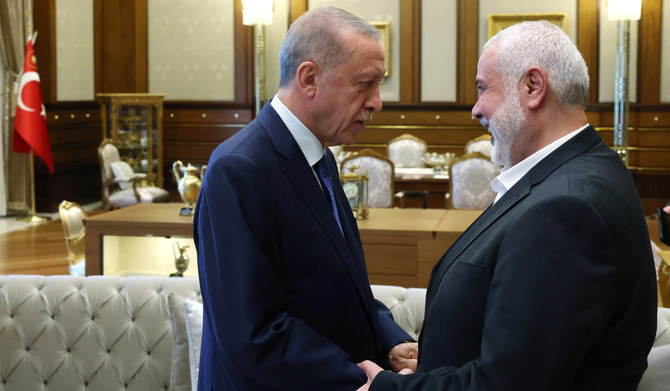
- Fidan said he spoke with Haniyeh, who lives in Qatar, about how Hamas — designated as a terrorist organization by Israel, the United States and the European Union — “must clearly express its expectations, especially about a two-state solution”
ISTANBUL: A leader of Palestinian militant group Hamas, Ismail Haniyeh, arrived in Istanbul Friday evening for talks with Turkish President Recep Tayyip Erdogan as the death toll in Gaza passed 34,000.
A statement from Hamas Friday said Erdogan and Haniyeh would discuss the conflict in Gaza, adding that the head of the group’s political bureau was accompanied by a delegation.
Middle East tensions are at a high after Israel’s reported attack on Iran and Gaza bracing for a new Israeli offensive.
Erdogan insisted on Wednesday that he would continue “to defend the Palestinian struggle and to be the voice of the oppressed Palestinian people.”
But talking to journalists on Friday, he refused to be drawn on the details on the meeting.
Turkish Foreign Minister Hakan Fidan was in Qatar Wednesday and said he spent three hours with Haniyeh and his aides for “a wide exchange of views in particular about negotiations for a ceasefire.”
Qatar, a mediator between Israel and Hamas, acknowledged Wednesday that negotiations to end hostilities in Gaza and liberate hostages were “stalling.”
Fidan said he spoke with Haniyeh, who lives in Qatar, about how Hamas — designated as a terrorist organization by Israel, the United States and the European Union — “must clearly express its expectations, especially about a two-state solution.”
Erdogan’s last meeting with Haniyeh was in July 2023 when Erdogan hosted him and Palestinian president Mahmud Abbas at the presidential palace in Ankara. Haniyeh had last met Fidan in Turkiye on January 2.
The war in Gaza started after Hamas’s unprecedented attack on Israel on October 7 that resulted in the deaths of about 1,170 people, mainly civilians, according to an AFP tally of official Israeli figures.
Militants also took about 250 hostages. Israel says around 129 are believed to be held in Gaza, including 34 presumed dead.
Israel’s retaliatory military campaign has killed at least 34,012 people, mostly women and children, according to Gaza’s Hamas-run health ministry.
Huge blast at military base used by Iraqi Popular Mobilization Forces, sources say

- PMF sources said the strikes targeted a headquarters of the PMF at the Kalso military base near the town of Iskandariya around 50 km south of Baghdad
BAGHDAD: A huge blast rocked a military base used by Iraq’s Popular Mobilization Forces (PMF) to the south of Baghdad late on Friday, two PMF and two security sources told Reuters.
The two security sources said the blast was a result of an unknown airstrike, which happened around midnight Friday.
The two PMF sources pointed out the strikes did not lead to casualties but caused material damage.
PMF sources said the strikes targeted a headquarters of the PMF at the Kalso military base near the town of Iskandariya around 50 km south of Baghdad.
Government officials did not immediately respond to a Reuters request for comment.
The PMF started out as a grouping of armed factions, many close to Iran, that was later recognized as a formal security force by Iraqi authorities.
Factions within the PMF took part in months of rocket and drone attacks on US forces in Iraq amid Israel’s Gaza campaign but ceased to do so in February.


